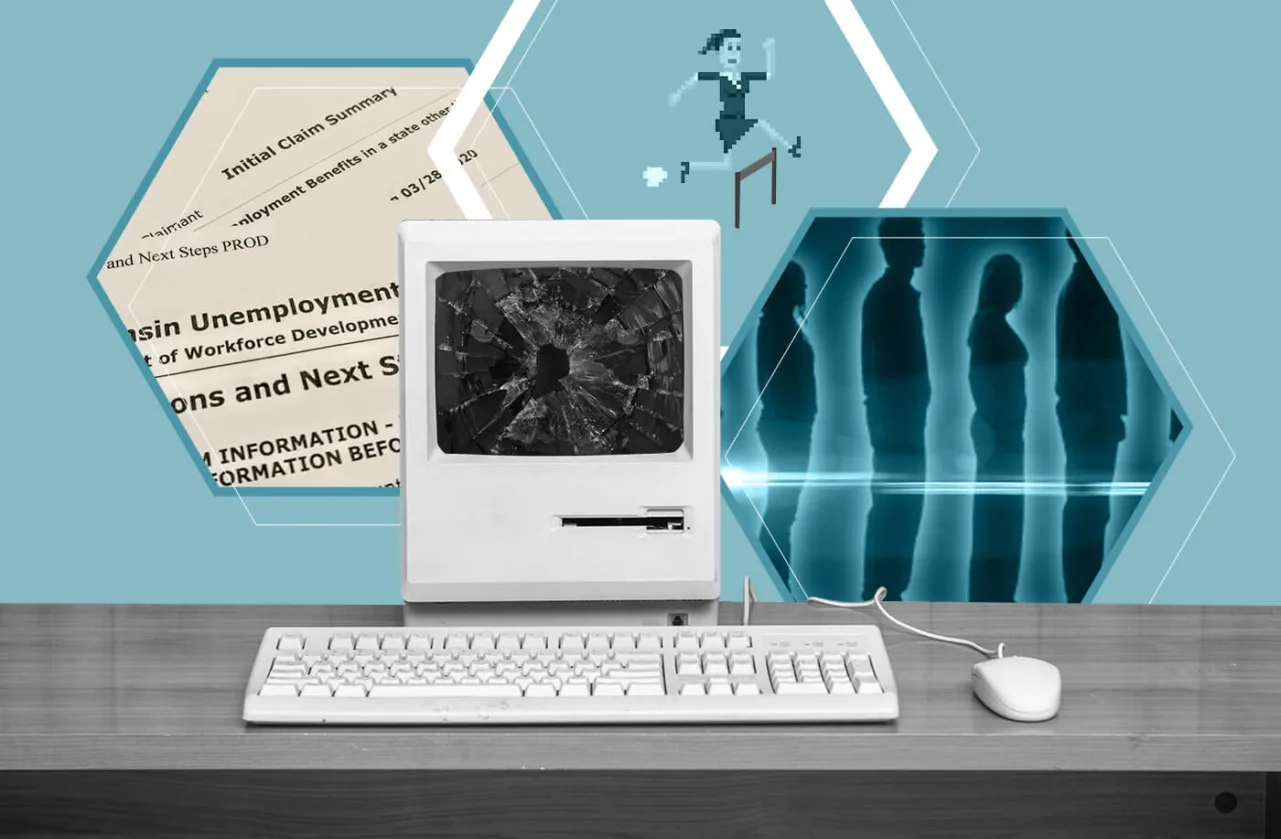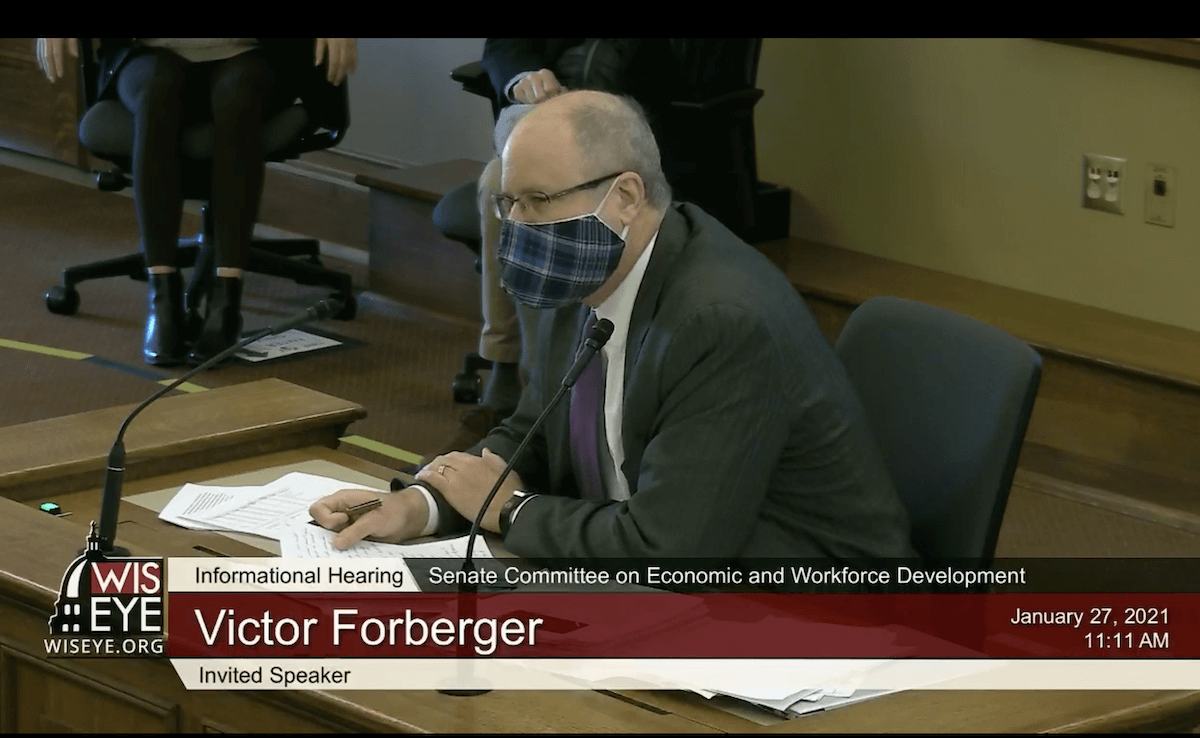
#image_title
#image_title
Labor expert: It used to take 11 questions to apply for jobless help. Now it’s more than 120, using an understaffed office and an antiquated computer system.
Kathy Anich, a substitute teacher from Mukwonago, worked right up until schools closed on March 16 with Gov. Tony Evers’ Safer at Home order.
She was told by her employer she’d qualify for unemployment, so like many Wisconsinites she had to wait as hundreds of thousands of people submitted applications to the underfunded and understaffed Department of Workforce Development (DWD).
Sen. Lena Taylor (D-Milwaukee) has been following issues with the unemployment system for years. She said it’s hard to understate how overwhelmed the department was by the sudden demand in UI benefits.
“They got three to four years [worth] of work at one time in a system where they didn’t have staff and they didn’t have the adequate equipment,” Taylor said.
Anich was relatively lucky; her application was approved and she started receiving benefits in April. When the typical end of the school year approached, she called DWD to ask if she should continue filing and was told she should, so she could continue receiving the $600 in federal benefits. When those ended in July she called again to check if she should continue filing and was told yes, so she could receive the additional $300 in state benefits.
When the school year started, she worked sporadically and checked if she should file on the weeks she wasn’t working and was told she should.
In December she got a call from a DWD adjudicator. The next day she was notified by DWD that it had been determined she had never qualified for UI benefits and she had to pay back the full $9,169 she had received, which includes the federal benefits.
“I asked numerous times,” Anich said. “I was under review three times and the first two times I was told, ‘You’re eligible keep applying.’”
Taylor said that in Anich’s case, the problem was that so many new employees had to be trained all at once by employees who were already “over-extended” and “near burnout.” The question of how to deal with the situation is more complicated: Anich accidentally received taxpayer dollars she may not have qualified for, but that doesn’t change the fact that she was unemployed and used those funds to stay afloat.
“There has to be a reasonable way to consider the circumstances that people are in,” Taylor said. “But that’s one of the reasons, in my opinion, if the legislators should be coming in and meeting and having dialogue.”
Anich immediately filed an appeal. Despite health issues and, at 62 year old, being relatively high-risk, she teaches whenever she can.
“I have to work because I need the money. I’m putting myself and my health in harm’s way,” she said. “One of these times I can’t dodge that COVID bullet forever. I have to do this because I don’t have a choice.”
She received a notice that her hearing was coming up, but as of Monday, no one had told her when it would be held.
A bill to address Wisconsin’s flailing unemployment system received unanimous approval Tuesday in the state Assembly—only after lots of partisan finger-pointing—and is on its way to Gov. Tony Evers for a signature after being passed by the state Senate last week. Democratic legislators and experts say while the bill is a start, it’s a long way from addressing the core issues delaying unemployment payments.
‘It’s not going to change all that much’
After months of acknowledging issues with the unemployment insurance (UI) computer system but bickering over how to address them, the bill includes a provision requiring the department to put out a request for proposals to upgrade the system which still relies in part on COBOL, or Common Business-Oriented Language, a programming language dating back to the 1960s.The department is not given a set budget, however, and would have to ask the Legislature to grant that funding.
Republican lawmakers have criticized the Evers administration for DWD processing unemployment claims so slowly, and Evers’ DWD secretary was forced to resign in September. But Democratic lawmakers note that their colleagues have known for many years about shortcomings with the system and failed to adequately address them, and on multiple occasions since 2011, the GOP-run Legislature made it harder for people to receive unemployment benefits, records show.
Assembly Democrats put forward amendments Tuesday which would have made it easier for people to continue receiving unemployment during the pandemic. One would have required the department to waive the one-week waiting period whenever there is a federal funding share in UI benefits, so the state doesn’t lose out on those funds like it did last year. Assembly Republicans killed the Democratic amendments, saying that they would make many people “dependent” on those benefits and arguing that there were jobs available in counties across the state.
But attorney Victor Forberger, who specializes in labor, employment, and unemployment matters, pointed out that New Jersey also has a COBOL-based unemployment system, and from March to December, it approved and made first payments for 77% of almost 700,000 pandemic unemployment applications. On that same timeline, Wisconsin had approved and paid approximately 30% of 130,000 applications.

“The back end is still old, but the front end is very modern and everything on that front end is now really difficult,” Forberger said. “The system had been designed to be so hard and so difficult and so incomprehensible that people just gave up filing. And then what happened with this pandemic was you had no choice but to file an unemployment claim because there were no jobs at all.”
He also noted that the software update is not going to help anyone who’s relying on unemployment now. What is helpful is the waiver of the one-week waiting period, though that only applies to new applicants, and extended benefits through June.
“Other than that, it’s not going to change all that much,” Forberger said.
That’s because the bill doesn’t address the system’s deeper problems, some of which are rooted in state laws passed after the 2008 financial crisis and some in department policies that he said were designed to make applying for unemployment difficult. In 2007, approximately 330,000 Wisconsinites received unemployment benefits; by 2019, that number had dropped to 120,000.
“In 2007, you could file your weekly claim by answering 11 questions. And now that weekly claim is 120-plus questions,” Forberger said.
Instead of uploading a resume, the website requires people to fill out their job history step-by-step, question by question, a tedious process particularly for Wisconsinites who lack access to broadband internet. And the long, complicated process creates many opportunities for discrepancies and errors that could get an application denied.
For example, if an applicant does not fill out a profile on the Job Center of Wisconsin website, even when job search requirements were waived, their claim can be denied. The department is also investigating applicants’ work histories and previous separations, even if their recent job loss is due to the pandemic. Many other states have waived those requirements which has streamlined the process; Wisconsin has not.
An audit from the Joint Legislative Audit Committee found that DWD was responsible for 11 out of the 13 weeks it took on average to process claims, and those delays were mainly caused by officials not requesting information they needed and not resolving issues when they did have the information. The department cleared its backlog by the end of 2020, but tens of thousands of cases are still waiting on adjudication.
Forberger recommended one small but important change to assist the newly jobless:
“I would empower all staff to decide cases immediately with the emphasis on approving benefits,” Forberger said. “If they see a reason to approve the benefits they should, and they should do it immediately.”
Politics

New Biden rule protects privacy of women seeking abortions
Under the new rules, state officials and law enforcement cannot obtain medical records related to lawful reproductive health care with the goal of...

Biden marks Earth Day by announcing $7 billion in solar grants
The Biden administration on Monday announced the recipients of its Solar For All Program, a $7 billion climate program that aims to lower energy...
Local News

Stop and smell these native Wisconsin flowers this Earth Day
Spring has sprung — and here in Wisconsin, the signs are everywhere! From warmer weather and longer days to birds returning to your backyard trees....

Your guide to the 2024 Blue Ox Music Festival in Eau Claire
Eau Claire and art go hand in hand. The city is home to a multitude of sculptures, murals, and music events — including several annual showcases,...



